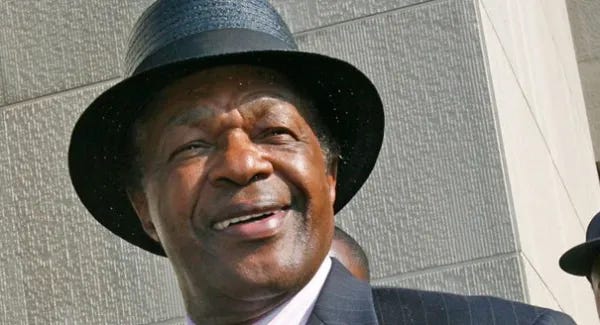'Except for Murders, City is Safe': The tragedy of the repeater
It’s not very All Lives Matter to yada yada past murders in search of Larger Truths about crime.
“Except for murders, city is safe” reads the headline of a March 1989 Associated Press story on Washington, D.C.
The lede: “District of Columbia Mayor Marion Barry Jr. said Thursday that the nation’s capital remains safe for tourists and visiting business people, even in the face of a record murder rate.”
This story shows journalism at its worst, the news as a repeater of whatever sounds interesting.
This is the news that’s not true, it’s just “true that someone said it.”
At a luncheon of Washington journalists, at the National Press Club, D.C. Mayor Marion Barry said:
″For the most part, the targeted killings and drug activity take place in a small section of the city...Except for the killings, Washington has one of the lowest crime rates in the country.″
AP tells us that Barry is the first mayor of Washington to speak at the club in its 81 years. But the framing of the story tells us more about the failure of the news business to tell truth.
Barry went into the lion’s den, a room full of journalists, and made a most ridiculous claim: “Except for the killings,” D.C. is safe.
The instinct of the newsman is to take the newsmaker up on that challenge. But it’s a fool’s errand to unbundle that most violent of crimes, murder, from crime.
The AP report continues:
“In 1988, a record 372 people were killed in the district; police say drugs played a part in 60 percent of those killings. Through Thursday, 119 people have been murdered this year in the nation’s capital, roughly twice the number at the same time last year. Barry stressed repeatedly that Washington’s drug-related killings are occurring in poorer neighborhoods far from the downtown and the national monuments.
″Congress is safe; everyone is safe,″ Barry said. ″I hope to come back here next year and tell you Washington is safer than ever before.″
Safe, except for the killing fields. This was the argument for decades, in cities from D.C. to Detroit — that murders were crimes of proximity, between people who know each other. Visitors, business people, rich people will mostly be fine.
Barry said the quiet part out loud with “Congress is safe; everyone is safe.”
Everyone that counts, he meant. So much for Black Lives Matter.
On Saturday Mona Charen, an editor of The Bulwark, tweeted:
“Other than murder, violent crime is not up. Did you know that? Violent crime is a key midterm voting issue, but what does the data say?”
Charen cited a Pew Research Center report, “Violent crime is a key midterm voting issue, but what does the data say?”
All these years later, the media is still trying to float Marion Barry’s trial balloon. A foolish premise is the zombie the news business can’t outrun.
When Marion Barry said “safe, except for murders,” that was a beleaguered mayor trying to minimize a dangerous city. The AP quoted him because it made for a good headline.
We were not supposed to treat Barry’s premise as useful — it isn’t — or use it as a tool for analysis. It’s a desperate argument, something only a police chief or a politician would say.
Call me old fashioned, but it’s not very All Lives Matter to yada yada our way past murders in search of Larger Truths about crime.
This is how we get headlines about fiery but mostly peaceful protests. This is a news business that does not tell truth. It enforces narratives. Even when they conflict with your lived experience.
News writers believe they are being witty when they quote public officials, like Barry, saying ridiculous things. The place for those quotes is the body of the story, where the statement can be refereed. Not in the headline.
Headlines like “Except for Murders, City is Safe, Mayor Says” are a credibility killer for the news business.
We expect politicians to be full of beans. We then expect the media to correct them. We don’t expect the press to thoughtlessly print whatever was said.
Those news professionals who seek and print the truth, we call reporters. Those who print foolishness, without pushback or challenge, we call repeaters.
AP was a repeater that day. Because its reports travel the world, that failure was legitimized, and has been repeated many times since.
Decades later, Barry’s failed analysis is still considered an interesting what-about, by journalists who should know better.





